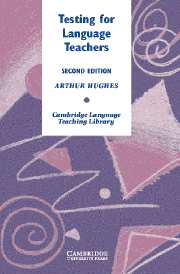Book contents
- Frontmatter
- Contents
- Acknowledgements
- Preface
- 1 Teaching and testing
- 2 Testing as problem solving: an overview of the book
- 3 Kinds of tests and testing
- 4 Validity
- 5 Reliability
- 6 Achieving beneficial backwash
- 7 Stages of test development
- 8 Common test techniques
- 9 Testing writing
- 10 Testing oral ability
- 11 Testing reading
- 12 Testing listening
- 13 Testing grammar and vocabulary
- 14 Testing overall ability
- 15 Tests for young learners
- 16 Test administration
- Appendix 1 The statistical analysis of test data
- Appendix 2 Item banking
- Appendix 3 Questions on the New Zealand youth hostels passage
- Bibliography
- Subject Index
- Author Index
- Frontmatter
- Contents
- Acknowledgements
- Preface
- 1 Teaching and testing
- 2 Testing as problem solving: an overview of the book
- 3 Kinds of tests and testing
- 4 Validity
- 5 Reliability
- 6 Achieving beneficial backwash
- 7 Stages of test development
- 8 Common test techniques
- 9 Testing writing
- 10 Testing oral ability
- 11 Testing reading
- 12 Testing listening
- 13 Testing grammar and vocabulary
- 14 Testing overall ability
- 15 Tests for young learners
- 16 Test administration
- Appendix 1 The statistical analysis of test data
- Appendix 2 Item banking
- Appendix 3 Questions on the New Zealand youth hostels passage
- Bibliography
- Subject Index
- Author Index
Summary
The assumption is made in this chapter that the objective of teaching spoken language is the development of the ability to interact successfully in that language, and that this involves comprehension as well as production. It is also assumed that at the earliest stages of learning formal testing of this ability will not be called for, informal observation providing any diagnostic information that is needed.
The basic problem in testing oral ability is essentially the same as for testing writing.
We want to set tasks that form a representative sample of the population of oral tasks that we expect candidates to be able to perform.
The tasks should elicit behaviour which truly represents the candidates' ability.
The samples of behaviour can and will be scored validly and reliably.
Following the pattern of the previous chapter, we shall deal with each of these in turn.
Representative tasks
Specify all possible content
We will begin by looking at the specified content of the Cambridge CCSE Test of Oral Interaction, covering all four levels at which a certificate is awarded.
Operations
Expressing: likes, dislikes, preferences, agreement/disagreement, requirements, opinions, comment, attitude, confirmation, complaints, reasons, justifications, comparisons
Directing: instructing, persuading, advising, prioritising
Describing: actions, events, objects, people, processes
Eliciting: information, directions, clarification, help
Narration: sequence of events
Reporting: description, comment, decisions and choices
Types of text Discussion
Addressees ‘Interlocutor’ (teacher from candidate's school) and one fellow candidate
Topics Unspecified
Dialect, Accent and Style also unspecified
It can be seen that the content specifications are similar to those for the Test of Writing.
- Type
- Chapter
- Information
- Testing for Language Teachers , pp. 113 - 135Publisher: Cambridge University PressPrint publication year: 2002



